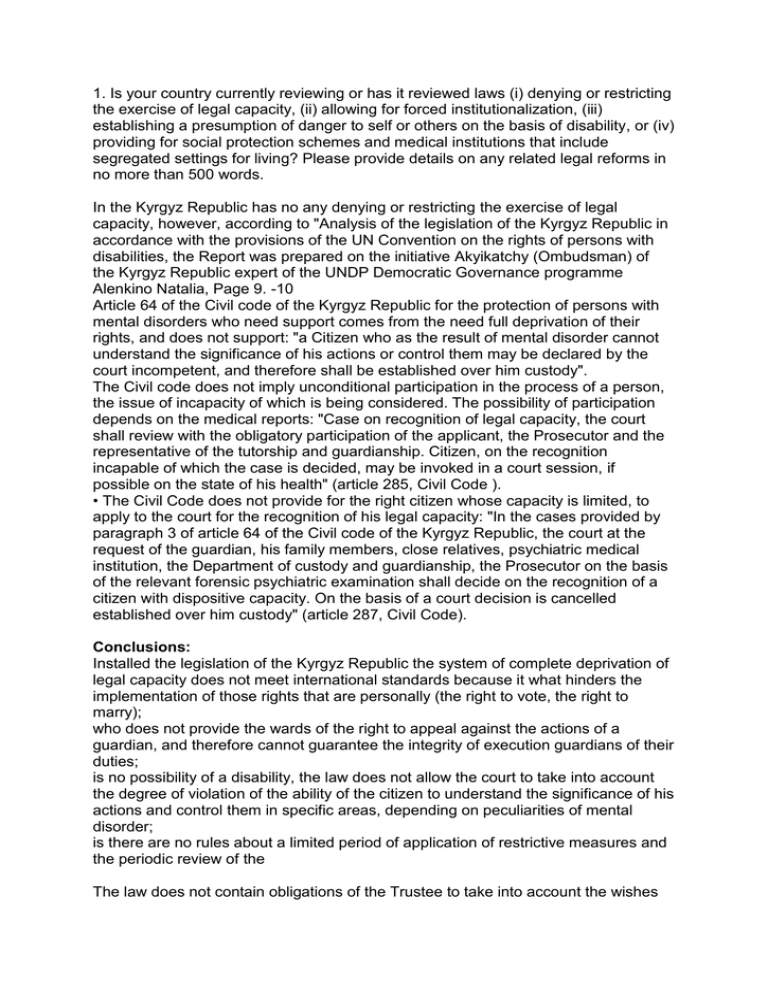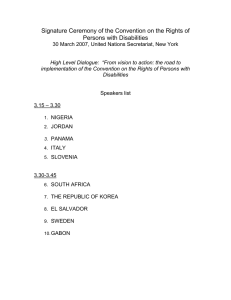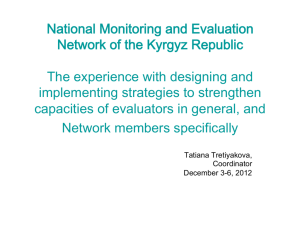1. Is your country currently reviewing or has it reviewed... the exercise of legal capacity, (ii) allowing for forced institutionalization,...
advertisement

1. Is your country currently reviewing or has it reviewed laws (i) denying or restricting the exercise of legal capacity, (ii) allowing for forced institutionalization, (iii) establishing a presumption of danger to self or others on the basis of disability, or (iv) providing for social protection schemes and medical institutions that include segregated settings for living? Please provide details on any related legal reforms in no more than 500 words. In the Kyrgyz Republic has no any denying or restricting the exercise of legal capacity, however, according to "Analysis of the legislation of the Kyrgyz Republic in accordance with the provisions of the UN Convention on the rights of persons with disabilities, the Report was prepared on the initiative Akyikatchy (Ombudsman) of the Kyrgyz Republic expert of the UNDP Democratic Governance programme Alenkino Natalia, Page 9. -10 Article 64 of the Civil code of the Kyrgyz Republic for the protection of persons with mental disorders who need support comes from the need full deprivation of their rights, and does not support: "a Citizen who as the result of mental disorder cannot understand the significance of his actions or control them may be declared by the court incompetent, and therefore shall be established over him custody". The Civil code does not imply unconditional participation in the process of a person, the issue of incapacity of which is being considered. The possibility of participation depends on the medical reports: "Case on recognition of legal capacity, the court shall review with the obligatory participation of the applicant, the Prosecutor and the representative of the tutorship and guardianship. Citizen, on the recognition incapable of which the case is decided, may be invoked in a court session, if possible on the state of his health" (article 285, Civil Code ). • The Civil Code does not provide for the right citizen whose capacity is limited, to apply to the court for the recognition of his legal capacity: "In the cases provided by paragraph 3 of article 64 of the Civil code of the Kyrgyz Republic, the court at the request of the guardian, his family members, close relatives, psychiatric medical institution, the Department of custody and guardianship, the Prosecutor on the basis of the relevant forensic psychiatric examination shall decide on the recognition of a citizen with dispositive capacity. On the basis of a court decision is cancelled established over him custody" (article 287, Civil Code). Conclusions: Installed the legislation of the Kyrgyz Republic the system of complete deprivation of legal capacity does not meet international standards because it what hinders the implementation of those rights that are personally (the right to vote, the right to marry); who does not provide the wards of the right to appeal against the actions of a guardian, and therefore cannot guarantee the integrity of execution guardians of their duties; is no possibility of a disability, the law does not allow the court to take into account the degree of violation of the ability of the citizen to understand the significance of his actions and control them in specific areas, depending on peculiarities of mental disorder; is there are no rules about a limited period of application of restrictive measures and the periodic review of the The law does not contain obligations of the Trustee to take into account the wishes and opinion of the person under guardianship. If the Trustee is acting contrary to the opinion of the ward, in the legislation there are no mechanisms of conflict resolution independent body Article 12 of the Convention is the Central character, so the impact of restrictions of the right to equality before the law is a violation of other rights recognized by the Convention: 2. Does your country already have or is it currently developing a programme or plan to promote the implementation of services enabling independent living such as: personal assistants, home assistants or other community-based services regardless of the kind of impairment? If so, please provide information on these plans detailing sources of payment, control over the services and availability in all areas of the country (no more than 500 words). No, we have no such kind of plan, we have following legal programs Strategy of Social Protection Development Of The Kyrgyz Republic for 2012 - 2014 and now is developing Strategy of Social Protection Development Of The Kyrgyz Republic for 2015 - 2017 and APDC, our organization participated on the first strategy drafting and now also is participating on the writing process as a paret of Civil society, Resolution Of The Government Of The Kyrgyz Republic “On Approval of Measures of State Support to Individuals with Disabilities for 2006-2010”, “About the Complex of measures on ensuring the rights and improve the quality of life of persons with disabilities in the Kyrgyz Republic for the years 2014-2017”, all of this documents about access to medical, educational and other services, prevention on disability etc. However, specific norms or plan does not exist. Before our country has no any standard for institutions, rehabilitation centers and for other organizations which provide services for children and people with disabilities and with participation of our organization was accepted Resolution of the Government of the Kyrgyz Republic, Bishkek, July 8, 2014 № 381 “On approval of the state minimal social standards of social services provided to persons with disabilities, including children, in a yard organizations and social service agencies”. 3. Does your country have effective mechanisms that persons with disabilities could successfully employ in case of denial of access to services enabling independent living and inclusion in the community including access to facilities for the general population on an equal basis with others? If so, do those mechanisms guarantee reasonable accommodation when necessary services or support are not in place? Please provide information on good practices. We have a special measure, The law of the rights and guarantees of people with limited abilities of health according to article 27. Persons with disabilities have the right to work regardless of the category and group of disability and article 28, the obligation of employers is to create jobs for employment of persons with disabilities taking into account the established quota. In the Kyrgyz Republic has good cases when people with has disabilities work in commercial bank, furniture and other organizations. Most of people work or hired by disability organizations. For instance: NGO "Talykpas Ata" produces furniture and hires people with disabilities. NGO "Movement of the young people with disabilities", leader Mirbek Asangariev also hires people with disabilities. email" miki69@mail.ru Handicap International in the Kyrgyz Republic did a good research work "Baseline Report and Methodology Baseline Survey on the situation of people with disabilities in Kyrgyzstan in regards to access to (inclusive) employment" For more information please contact to Zharkyn Baiazova zharkyn.baiazova@hi-cis.org (project specialist) or Myriam Abord-Hugon <myriam.abord.hugon@hi-cis.org (director). 4. Is your country involved in international cooperation programmes related to ensuring the right to live independently and to be included in the community? If so, is your organization involved in any such programme? No, has no such programme. 5. Does your country collect statistics and disaggregated data on services provided to ensure independent living and inclusion in the community? No has no exact statistical date.



